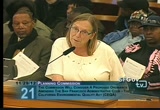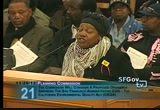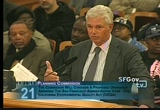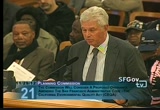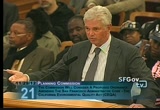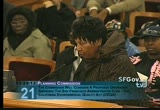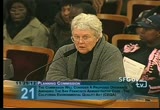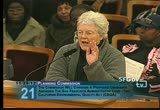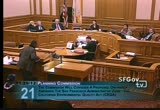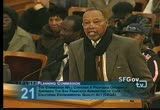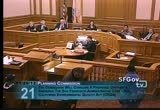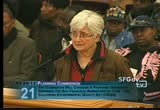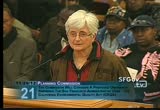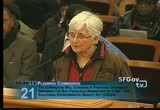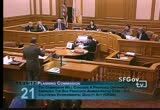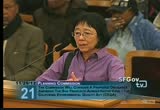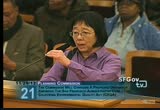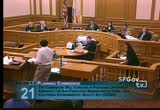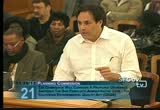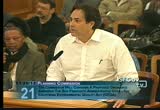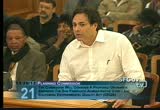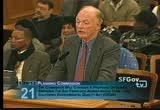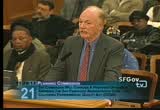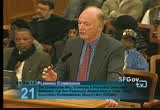tv [untitled] December 1, 2012 1:00am-1:30am PST
1:00 am
we were then able to appeal them. and it was based on that that there were some delays. you know, it really frightens me when people want to keep the public out of information. this is not nimby. this is not our backyard. this is our tax dollars. i lived there for over 30 something years and i'd like to see it done right. and people are concerned. rec and park would not turn over information. if we had had a 10 or 20-day limit, nothing could happen. and with the types of vacations that folks get, no offense, we can't even get hold of the people responsible to get an answer. thank you. good afternoon, my name is
1:01 am
[speaker not understood] hawkins okari. i was literally born, literally born in the most polluted neighborhood in this city in the southeast sector. i have literally lived in that area my entire life. i'm a member of the black human rights leadership coalition and i am in total disagreement with this legislation. good afternoon, commissioners. steve [speaker not understood] for [speaker not understood]. i'm here to speak in support of the legislation. -- that supervisor wiener has introduced. * a little bit of history. c-e-q-a was introduced at the state level in 2003, submitted
1:02 am
in 2002 starting january 1 of 2003 requiring every c-e-q-a determination to be appealable to the legislative body of the county, in this case the board of supervisors. so, we've been ten years now with any procedures which [speaker not understood] cad ex appeals can go to a board. [speaker not understood] we're the only county in the state where every permit is discretionary and therefore every permit is subject to c-e-q-a. so, we have thousands of discretionary decisions every year that implicate c-e-q-a. what this ordinance simply does, it doesn't cut out any appeal rights. it simply lays out a clear procedure for when appeals are to occur and how they are to occur. and secondly, it increases substantially the notice requirements. in order for these shortened appeal periods to apply, there must be enhanced noticing. so, there is no opportunity or zvi agencies such as rec, park or any agencies to take
1:03 am
advantage of the shortened appeal periods unless they improve noticing. [speaker not understood]. the city has no ability to modify c-e-q-a. c-e-q-a is a state law. we can only do things that are consistent with c-e-q-a to fill in the gaps forsee qua as [speaker not understood] described t. you've heard a lot today about an allegation what this ordinance is trying to do is to substitute the substantial evident test for the fair argument test. simply not true. what the fair argument test is, quote, substantial evidence to support a fair argument. it's not fair argument by itself. it's substantial evidence to support a fair argument. what the ordinance says if you're going to appeal a c-e-q-a determination, you need to provide that substantial evidence to support your fair argument. that's all it does. it's no change in the standard to review, and we can't possibly change the standard of review because that standard of review is established by the california supreme court and the legislature.
1:04 am
another important thing that this ordinance does, it establishes a briefing schedule at the board of supervisors when there is an appeal. right now there is no schedule for how an appeal happens. someone can file an appeal with one sentence, this is what happened most recently in the case i had. one sentence appeal, there was no briefing that was done. the planning department staff had to sort of guess what the appeal was about. they spent 100 hours responding to the appeal, wrote a 20-page brief to the board of supervisors defending the c-e-q-a document. the appellant never briefed. the appellant didn't even show up at the hearing. this ordinance also provides an established briefing schedule so the appellant must provide the arguments, the substantial evidence at the beginning of the appeal process. planning staff has an opportunity to respond in a timely way before the hearing so that that will be a surprise aloe limb nayedth. i urge your support and i urge you also to rely on your staff to respond to some of these particular comments that have been made which i think are
1:05 am
simply -- >> excuse me, your time is up. good afternoon. my name is angela armstrong and i am here on behalf of the hunters point art gallery and culture center located in bayview hunters point. we've been in existence for over four years. we totally reject leaner legislation. thank you. sue hester. i think i've probably done more c-e-q-a work before this commission in the city than anybody. and i was going to just sit this hearing. what mr. vettle said provoked me to come up.
1:06 am
if the planning department, if supervisor wiener had gone about this really correctly, they would have solicited comments by everyone who is responding because they were surprised. this is not the way to do legislation. i have my own list of c-e-q-a improvements and therefore a few that i want. but i wasn't asked by scott wiener. i wasn't asked by by bill wyco. i wasn't asked by anybody. and i get every notice that you conceivably have. in a lawsuit settlement, back in the '80s, i insisted that i get cad ex he's. i'm the only person that gets them and i read them. * i am not the cad ex a stamp on the back of a permit. but if they issue them, you will find me on that list
1:07 am
because of a lawsuit settlement that should not have to come to this point. i know because i get the notices that no one else gets what i get. i spread the word as effectively as it is when i get notices. this is not the right way to do it. go back, supervisor. go back, staff, and have a real outreach process. i would be more than glad to participate in a real outreach process about amended c-e-q-a. i know [speaker not understood] because i lived them. but this is a wrong process. the fact that developers attorneys are happy probably means that they were consulted.
1:08 am
who was the consultation with? between a mr. wyco said he didn't have any e-mails. i asked for his e-mails. he doesant have any. maybe he didn't talk to anybody, but i didn't ask for scott wiener's e-mails. but someone should. who is he talking to? say no. >> thank you. good afternoon. my name is robert woods. i'm with the black human rights leadership council for san francisco. what you're looking at here is a pocketbook issue. you've got developers who don't care whether you lived in a hell hole or what. it's only what they want.
1:09 am
let me tell you this. i worked several years for san francisco planning department back in the '70s. you look at this type of issue where it's coming from a supervisor or someone else who is feeding into your system to change your system. he is not motivated by his own thought. he is motivated by what coalition he can build in the neighborhood the next project working towards. you have to understand the system because you're a part of that system. you have to say no to this type of thing. blind siding this neighborhood is not the way to travel. these people pay your salary. they pay -- maybe not your
1:10 am
salary, but they pay the system's salary. so, i think what you need to do is start taking care of that kind of business that will give the community more say so instead of someone sitting in high places developing policies to ram it down the community's throat. thank you. vote no. >> thank you. good evening, commissioners. my name is vernel hawkins. [speaker not understood]. there's about 12 million people standing behind me, okay. now, what i'm going to say to you is this basically. what you heard from everybody just about two-thirds of have been against this because it's wrong. it's just wrong. let's get to the gist of it. people have a right to disgrape with something and a due
1:11 am
process to do it in. don't take that away because when you take away some of what you're doing now because you will answer. thank you. good afternoon, commissioners. my name is judith hoyam and i know you've heard a lot of testimony and you've also gotten a lot of feedback in writing, very well reasoned and specific feedback. so, i just want to add my voice to say that i hope you're going to take seriously the concern that people who are involved in land use issues have about this legislation and feeling that it may make it harder for people to respond to real issues of
1:12 am
c-e-q-a. i'm not sure about all the abuses that are being referenced. i don't know what those abuses are. my position, i'm a chair of a land use committee of neighborhood association, [speaker not understood] valley association which comes to castro and upper market. on my level there is some abuse of c-e-q-a. c-e-q-a is hardly even brought to bear on the kind of projects that we're looking at. * no abuse however, eureka valley has an enormous number of historic resources which have not been mapped and have not been surveyed except for the windshield survey which, as i read the legislation, it seems as though those historic resources are not official and would not be protected with some level of protection would be removed by this legislation.
1:13 am
they wouldn't be defined as historic resource, something like that. it's very com merit indicated, though. * complicated so, i think ordinary people who don't have a background in the law, they just have to rely on you to, to look at the details of this legislation and think about how it's going to apply, how it's going to affect the public's right to know. i just add that our ability to know is very limited to know what's going on in the planning department, is very live ted. and when a project is under review in the planning department, we don't know that it's happening. now on the level that i work on, the neighborhood level, we now finally have the pre-application notification, brand-new, completely wonderful because we don't have to wait
1:14 am
for the 311 notice before we know what's going on. so, please take to heart all the concerns that have been expressed to you. thank you. >> thank you. next speaker, please. if i can have the overhead, please. good afternoon or good evening, commissioners. my name is joe butler. i'm an architect here in the city. one of the things that i had seen in the legislation because of some concern, if the resources that were inventoried hadn't been updated, if the inventory itself hadn't been updated within five years, then one couldn't use that inventory as a basis for declaring that a
1:15 am
building is an historic resource. well, the planning department barely does inventory. and when they do the inventory there may be two or three or five-year's time. let alone the backlog of updating that would have to occur in order to make the existing adopted surveys updated for the purposes of this legislationedthv i'd like to show you on the overhead some houses, 2564 sutter street. this house was saved by c-e-q-a. * water color of the same property, they wanted to take out the garden and put in you a garage and add about 5,000 square feet to this 1500-square foot home. this little house was saved by c-e-q-a, 40 38 17th street. 40 38 was to be replaced by an apartment building in demolition, but a c-e-q-a appeal saved that project. all the way along, the planning commission approved an apartment building. the board of appeals upheld an
1:16 am
apartment building. but the board of supervisors said, no, the house has merit. this is the oldest house in noe valley saved by c-e-q-a, 39 chattanooga. they wanted again to make a multi-unit building here. many more thousands of square feet. because of c-e-q-a, they made an addition to the rear of this house and the historic resource was saved. here's a case where the c-e-q-a notices that sue hester mentioned, they come in the mail. several of us have them. and somebody saw this photograph and said, that looks like a refugee shaq. and sure enough at 5 -- 252 hole -- holyoke, two refugee shacks [speaker not understood]. [speaker not understood] they
1:17 am
were going to make an addition to loom over the little house in the front. the house had original windows. c-e-q-a saved this house. there is an addition at the rear which is the same footprint, the same square footage as the old building, but no more. 4 49 [speaker not understood] was not saved by c-e-q-a. they were allowed to lift this house up, put it in the center of a three-story building and add a garage underneath it, triple the size of the building. nobody watched this one. >> thank you. >> and that's the difference between a successful outcome under c-e-q-a as we have it. >> thank you. your time is up, sir. if we can further, it would only get worse. (applause) members of the commission, my name is [speaker not understood]. i think what is before you today is purely procedure. it gives the public two things,
1:18 am
especially when it comes to categorical exemption. it gives members of the public notice that something is going to happen so that if it is one of the cases that was referred to by mr. butler, the public would have 30-day notice so they can act on it early. what is happening now and what the type of individual most affected by not having an appeal defined appeal period, the homeowners who want to do something to their home in the back, expand it, or someone who wants to tear a building down that has -- that does not have any significance, historic significance, what happens now, you go through the planning process, a dr is filed, you come before the commission. then you wait until a building permit is issued. then they go to the board of permit appeals. and then at the board of permit
1:19 am
appeals they actually have a hearing, get the commission's decision affirmed, then there is a ten-day period on rehearing. the ninth day they file an appeal. what happens is then they go to the board of supervisors. one of the cases [speaker not understood] the commission knows about the one on 32nd avenue and el camino del mar. that project is going to go back before you. it had a full hearing before this commission. but because of the process that i just described, it goes back to the drawing board. and, so, that project two years later is coming back before you after a new c-e-q-a review is again performed. so, all this legislation does is make sure the c-e-q-a review
1:20 am
and appeal is done properly at an earliest possible time. and if anything fall through the cracks by the staff or a pushy developer, it gets caught early in the c-e-q-a process. and i urge that this commission vote in favor of this -- recommend approval of this ordinance to the board of supervisors. hi, commissioners, [speaker not understood] san francisco preservation consortium. the whole conceptual basis for this legislation is instances of c-e-q-a abuse that brought this about. there is a little bit about codifying it and making it a little bit clearer. so, you're an independent body. you can requisition that information if you want. i wanted to point out there is
1:21 am
a list of 48 appeals since 2010 that is part of your packet. the case studies that were done identified three of them -- three -- as abuse examples. one of them lafayette park wasn't a c-e-q-a delay. you heard two people here talk about that already. another one, 31 51 scott street cowed a maximum two-month delay. so, a two-month delay is what this comes down to. the third, 28 53 broderick forced a discussion between neighbors and the developers who would not otherwise have happened. so, if you want to, why don't you go ahead and requisition that information. let's weigh this hevthv. one of the examples i could give you is that a single person filed a c-e-q-a review for 869 northpoint. * them
1:22 am
but behind that c-e-q-a review, there were more than 200 people as part of the aquatic park neighbors. we sat around and said whose name goes on the c-e-q-a review? the reason we had to file that c-e-q-a review is because the process upstream wasn't performed correctly. what we found as a result of the review was that the developer, in order to obtain a demolition permit, had misrepresented, i.e., lied on his applications about the age of the building, about its historical significance. thankfully, because of the review, there was the revelation that this in fact was property in a historic, prospective historic neighborhood, contiguous historic neighborhood block 26. we found that the person who had built the house and lived in the house had a direct historic recognition which is part of c-e-q-a. c-e-q-a recognizes historic contexts.
1:23 am
because he was the reservoir keeper which is a block away. we also found out that the -- so, basically, the point of that is that if it weren't forsee qua in that case 869 would not have been -- it would have been demolished. it's an a forwardable house. a family is living there now. it was abuse of the process upstream. so, c-e-q-a, had there been an appeal at the beginning of the project, would never have happened. this information would not have come forward from the planning department that did the further investigation. thank you. >> thank you. is there any additional public comment? okay. seeing none, public comment portion is closed and opening it up to commissioners for comments. commissioner borden. >> there's a lot to be said. i want to ask maybe staff a few
1:24 am
clarifying questions about the legislation and just general process. so, one is the point that was brought up related to now you've moved it up, if there was a c-e-q-a -- if there was a zoning decision and general plan, zoning map amendment decision that was going before the board, then the c-e-q-a to be heard with that decision is what we were told. does that mean it would supersede whether or not it had been heard at the planning commission? >> bill wyco, planning staff. simply no. all the example was a park merced treasure island. the process that went on -- >> right, right. just in general. >> would not be changed. [multiple voices] >> so, e-i-r is prepared, it's published. there is a hearing at this body. there is comments and responses. there's a --
1:25 am
>> my only question to you, so, the certification process would still have to happen -- that hearing to certify or not to certify, presumably we'd have to certify the document before it could go to the board -- >> that's correct. the only thing that changes on this proposal, department staff has raised some reservations about this proposal in terms of projects where the board is the ultimate decision maker in terms of process. you know, those concerns are over the fact there isn't a briefing, if you want to call it that. someone can bring a matter of c-e-q-a to the board without having submittal of appeal process. supervisor wiener called it kind of automatic appeal right. on balance, our judgment is that given some of the procedural games that are played at the board around something being calendared and then it being not being able to
1:26 am
be heard, in terms of the board's own procedures that there's advantage to this to this to outweigh that. cult managemently that is the decision of the board. the beneficiary of the proposal, that's the board. >> right, but i still want to get it straight. so, in order for them to actually hear any sort of zoning map amendments or legislative changes, the ordinance or the project e-i-r already would have been heard or environmental negative declaration, or whatever, your appeal would already have to happen first under the commission? >> under the [speaker not understood] existing lack of rules, negative declaration would come to you unless somebody chooses to bring to you. even though the document itself says you have 20 to 30 days to appeal to the planning commission. someone doesn't do that now in the absence of rules, effective rules, what we say doesn't matter. >> and then, so, in terms of,
1:27 am
you know, there's been an issue of other different sort of -- those other various permits, whether they be rec and park or a tree or -- all those other permits. are the appeals processes separate to those permits that are unrelated to c-e-q-a? >> [speaker not understood] the city attorney. basically contrary to what a couple people have said, not every single permit in the city is discretionary. only discretionary permits are subject to c-e-q-a. so, the permits that are discretionary, there is c-e-q-a review that is conducted. at this time in general, other than the special notice of the ordinance -- >> i understand what you're saying. i'm trying to figure out like if someone appeals -- if i appeal a tree permit, is that a c-e-q-a appeal or is that an appeal to the permit just generally and it doesn't have anything to do -- i'm trying to determine the differences because i think that that -- one of the things that's up for deebate --
1:28 am
>> deputy city attorney susan cleveland noel. my colleague might be able to elaborate on this further. yes, you can appeal a permit for any reason. normally through the board of appeals. * you could also appeal that same permit in most instances under c-e-q-a. >> so, the question is some of the appeals may not be c-e-q-a appeals. there would be other appeals. but then could you appeal the permit twice from the same agency, one time being c-e-q-a, one time being something else? >> that's what you do now, that's what you can do in the future. they're separate appeals. one is on the substance, the merits of the project. one is on the c-e-q-a. the difference now is depending on what permit it is, the public has made it abundantly clear, you may have no knowledge because there is no notice what they're supposed to do. if there is no notice about any discretionary action, that
1:29 am
notice will incorporate notice about the c-e-q-a that would, you know -- >> but you could appeal c-e-q-a on nonplanning related permits. i just want to -- >> yes. so, i guess -- so, in terms of this argument, looking at the first discretionary action, can you describe what currently are considered -- you said not all permits are discretionary permits. so, could you outline some of the permits that are discretionary? maybe the city attorney could do that. >> i'll take a start. i think the simplest thing is to talk about the things that are in the planning department's domain. conditional use permit is a discretionary permit. a building permit is maybe the most widespread for exemptions. but there are many departments that take discretionary actions. the park takes actions. mta takes actions, puc takes actions. some of those are discretionary, some are not. all that are discretionary subject to c-e-q-a.
68 Views
IN COLLECTIONS
SFGTV: San Francisco Government Television Television Archive
Television Archive  Television Archive News Search Service
Television Archive News Search Service 
Uploaded by TV Archive on

 Live Music Archive
Live Music Archive Librivox Free Audio
Librivox Free Audio Metropolitan Museum
Metropolitan Museum Cleveland Museum of Art
Cleveland Museum of Art Internet Arcade
Internet Arcade Console Living Room
Console Living Room Books to Borrow
Books to Borrow Open Library
Open Library TV News
TV News Understanding 9/11
Understanding 9/11